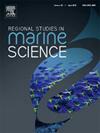Characterizing the marine recreational fishery of Hong Kong using data compiled from a social media platform
IF 2.4
4区 环境科学与生态学
Q3 ECOLOGY
引用次数: 0
Abstract
Intensive marine recreational fishing can lead to deleterious effects on fish stocks and marine ecosystems similar to large-scale commercial fishing. Nonetheless, recreational fishing is seldom included in fisheries management owing to a scarcity of reliable data in many regions, especially in Asia, which currently accounts for the bulk of total marine recreational catches and exhibits the strongest upward trend globally. In this study, we used photographic records of fish landings collated from a social media platform (Facebook) to characterize Hong Kong’s marine rod-and-line recreational fishery for the year 2019. We recorded 122 species from 49 families and estimated that recreational fishing contributed to a substantial proportion (>10–15 %) of total marine catches from Hong Kong’s waters. We found that recreational catches, with an economic value of nearly 32 million USD, exhibited a disproportionate dominance of large predators (e.g., groupers, seabreams, jacks and pompanos, snappers, croakers, Asian seabasses), although the vast majority (93.4 %) of targeted species lack conservation assessments at the regional level. Most notably, we observed that most commonly-exploited species exhibited truncated size distributions strongly indicative of overfished stocks. Our results serve as a baseline for the sustainable management of Hong Kong’s recreational fishery and suggest that focused strategies targeted at large predators are urgently needed. Moreover, our study highlights the potential for iEcology datasets (e.g., from social media platforms) to be a cheap and convenient but largely untapped means of monitoring recreational fisheries in lieu of traditional manpower-intensive surveys, particularly in regions that, to date, remain data-sparse.
利用社交媒体平台收集的数据描述香港海洋休闲渔业的特点
密集的海洋休闲捕鱼可能对鱼类种群和海洋生态系统造成类似于大规模商业捕鱼的有害影响。然而,休闲捕鱼很少被列入渔业管理,因为在许多区域,特别是在亚洲,缺乏可靠的数据,亚洲目前占海洋休闲捕捞总量的大部分,并在全球显示出最强劲的上升趋势。在这项研究中,我们使用了从社交媒体平台(Facebook)整理的鱼类上岸的照片记录,以表征2019年香港的海洋杆线休闲渔业。我们录得49科122种鱼类,估计康乐捕鱼占本港水域总渔获量的很大比例(> 10-15 %)。研究发现,尽管绝大多数(93.4 %)的目标物种缺乏区域层面的保护评估,但在经济价值近3200万美元的休闲捕捞中,大型捕食者(如石斑鱼、海鲷、鲹鱼、鲷鱼、黄花鱼、亚洲海鲈)的优势程度不成比例。最值得注意的是,我们观察到大多数常被开发的物种表现出截断的大小分布,这强烈表明过度捕捞的种群。我们的研究结果为香港休闲渔业的可持续管理提供了基础,并表明迫切需要针对大型捕食者的重点策略。此外,我们的研究强调了iEcology数据集(例如,来自社交媒体平台的数据集)的潜力,它可以成为一种廉价、方便但在很大程度上尚未开发的监测休闲渔业的手段,取代传统的人力密集型调查,特别是在迄今为止数据仍然稀少的地区。
本文章由计算机程序翻译,如有差异,请以英文原文为准。
求助全文
约1分钟内获得全文
求助全文
来源期刊

Regional Studies in Marine Science
Agricultural and Biological Sciences-Ecology, Evolution, Behavior and Systematics
CiteScore
3.90
自引率
4.80%
发文量
336
审稿时长
69 days
期刊介绍:
REGIONAL STUDIES IN MARINE SCIENCE will publish scientifically sound papers on regional aspects of maritime and marine resources in estuaries, coastal zones, continental shelf, the seas and oceans.
 求助内容:
求助内容: 应助结果提醒方式:
应助结果提醒方式:


